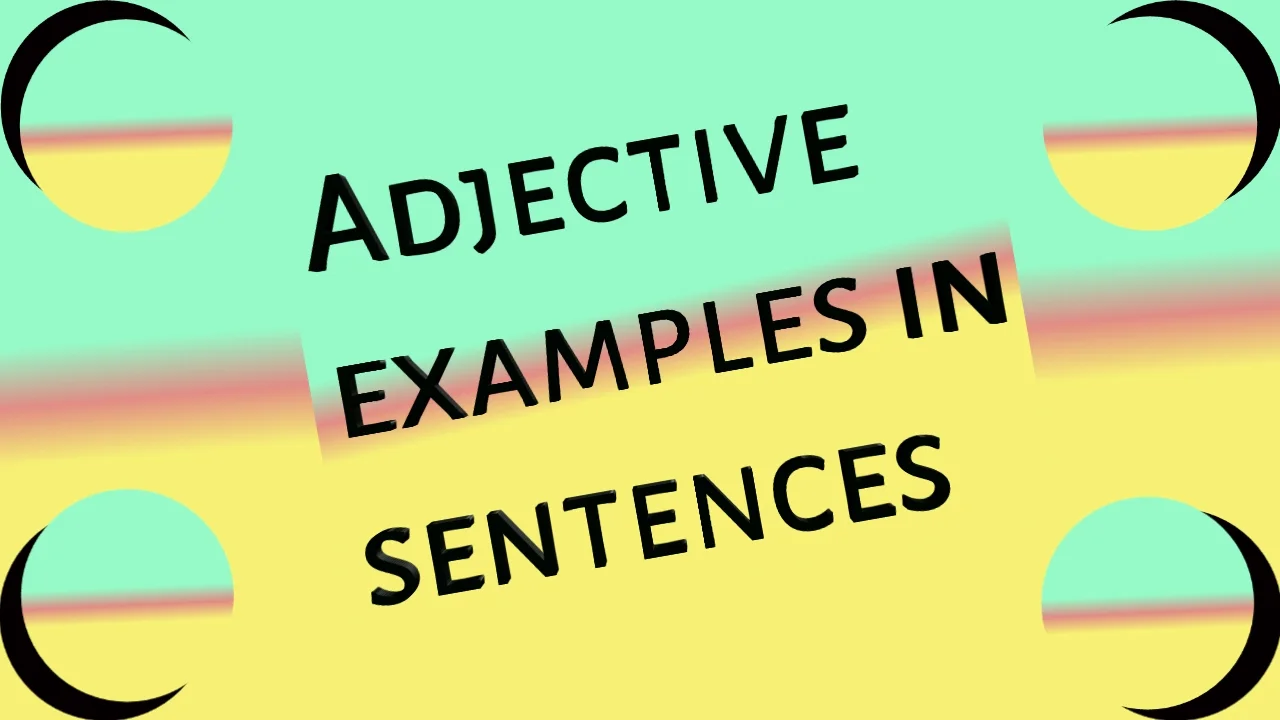Today, in this article, I’m going to discuss a very important topic which is Adjective. Here, I have written many adjective examples in sentences so that students can understand this topic very properly.
I have seen that most of the students are unable to use adjectives in sentences, that’s why I thought that I should definitely write adjective examples in sentences.
Hence without any further delay, let’s start writing adjective examples in sentences.
Table of Contents
Adjective Examples in Sentences with their Special Cases –
What is an Adjective? –
An adjective is a word, which is used to qualify a Noun or Pronoun.
For example –
( a ) Vijay is a good person.
( b ) That child is very intelligent.
( c ) I am a tall boy.
( d ) Akbar was a wise King.
In these examples, you can see that good, intelligent, tall and wise qualify Vijay, that child, I and Akbar respectively, so these words are adjectives.
Now, we will talk about the types of adjectives. Actually, there are totally eight types of adjectives and all these have been discussed below.
Read, the use of present participles in the sentences.
1. Adjectives of Quality –
These kinds of adjectives show the quality or defect of a person or thing.
For example –
( a ) Kamal’s father is an honest man.
( b ) Ritika is a wise student in this school.
In these examples, honest and wise are adjectives of quality.
2. Proper Adjectives –
The adjectives, which are made by using proper nouns are called proper Adjectives.
For example –
Buddhist monastery, British rule, etc.
Here, Buddhist & British are proper adjectives.
Read also, the most important abstract nouns.
3. Adjectives of Quantity –
Adjectives, which show the quantity of the things.
For example –
( a ) Please give me some milk.
( b ) I have enough water in my bottle.
( c ) There is sufficient sugar in the box.
Some, enough & sufficient are adjectives of quantity.
4. Adjectives of Number –
The words by which the number of things is known are called adjectives of number.
For example –
( a ) There are ten boys in the class.
( b ) Seema studies in seventh class.
In these examples, ten and seventh are adjectives of number. Moreover, few and several are also adjectives of number.
5. Demonstrative Adjectives –
You can understand demonstrative adjectives by seeing some examples described below.
( a ) This boy is very innocent.
( b ) These people are going to Dubai.
( c ) Those countries are very powerful.
where this, these and those are demonstrative adjectives.
6. Distributive adjectives –
Distributive adjectives are the adjectives, which address every person of any group.
For example –
( a ) Each woman is rich.
( b ) Every batsman is going to join the conference.
Note – If a noun is present just after each, every, either & neither, all these words ( each, every, either & neither ) will be distributive adjectives.
7. Interrogative Adjectives –
Adjectives that ask questions are interrogative adjectives.
For example –
( a ) Which book is yours?
( b ) Whose bag is this?
In these examples, which & whose are Interrogative adjectives.
8. Possessive Adjectives –
Adjectives, which are related to any person or thing.
For example –
my book, our school, your pen, his chair, etc.
where my, our, your and his are possessive adjectives.
Additionally, there is another rule about possessive adjectives and that is when we use words ( all & both ) at the beginning of the sentences, we put possessive adjectives just after these words.
For example –
( a ) All my friends have got a chance to reform their performance.
( b ) Both his sisters are eccentric.
Usage of Some Special Adjectives –
Well, the number of adjectives is very high and we use them in different ways such as positive, comparative and superlative degrees.
But, here I am going to tell about some special adjectives which cause a lot of confusion before using.
1. Use of some and any –
I have seen that students are confused to use both of these adjectives correctly. But, now I promise you’ll not face any problem using them individually.
( A ) Use of some –
Adjective some is used only in affirmative sentences before uncountable nouns to tell quantity.
Moreover, it’s also used just before plural countable nouns to tell numbers.
For example –
( a ) I have some water. ( where water is a U.C.N )
( b ) There are some girls in the classroom. ( where the word girls is a P.C.N )
( B ) Use of any –
Usually, the adjective any is used in negative and interrogative sentences.
For example –
( a ) I do not have any bikes.
( b ) Do you really have any problem?
2. Use of few, a few and the few –
( A ) few –
This adjective is used for those plural countable nouns, which are very few in number.
For example –
( a ) There were few students in the class, so I didn’t teach.
( b ) The show was canceled as few people turned up to see it.
( B ) a few –
This adjective is used for those plural countable nouns, which are considerable in number.
For example –
( a ) The owner of the shop advised his servant to rest for a few days.
( b ) He bought a new car a few days back.
( C ) the few –
This adjective is used for those countable nouns to which you point.
For example –
( a ) The few oranges I kept for you have been finished by Karan.
( b ) I’m talking about the few workers who are standing at the door.
This is the use of few, a few & the few. In the same way, we use little, a little and the little with uncountable nouns.
3. Use of adjectives with as …. as & so …. as –
When we use adjectives with as …. as & so …. as, always keep in mind that we use a positive degree of them.
It means, you can’t use comparative or superlative degrees of the adjectives with as …. as & so …. as.
For example –
( a ) Suman is as tall as her sister.
( b ) Usain Bolt ran as fast as he could.
( c ) Kavya is not so beautiful as Diksha.
( D ) Sushmita is not so dumb as her elder sister.
4. Use of adjectives with ior –
Adjectives such as superior, senior, junior, inferior, prior, anterior and posterior take to instead than in comparison sentences.
For example –
( a ) That task is inferior to before one.
( b ) Kapil is senior to Sameer.
( c ) Hero bike is superior to others.
5. Use of special adjectives –
When we use The before these adjectives ( rich, poor, aged, blind, dead, meek, wicked, needy ), they behave like plural common nouns.
For example –
( a ) The rich usually exploit the poor.
( b ) The meek is more honest than the wicked.
Where the rich means rich people and the meek means humble people. In the same way, you can define other adjectives.
Underline the adjectives in these stories –
Story 1 –
When I was going to Delhi by train, I saw an old woman in my compartment. She was looking very anxious. Looking at her sad face I asked her, mother why are you so sad?
As soon as I asked this question to that old woman, she began to cry and said to me that I’m very hungry and no one is giving me alms by which I could buy some food to eat.
After hearing this, I also became very sad and decided to help her.
When the train stopped at Ghaziabad station, I got off the train and bought some fresh bananas and a bottle of mango juice.
As soon as, I gave her those fruits and the bottle of mango juice, that despondent woman was surprised and became happy.
After eating those fruits and drinking juice, she gave me lots of wishes for my great future.
Story 2 –
Akbar is known as the greatest rulers of India and Babar is known as a Mughal king in India. Babar’s son whose name was Humayun died in 1556.
He died when his son ( Jalaluddin Akbar ) was only thirteen year old. At the time of Humayun’s death, Akbar was at Kalanaur in Punjab was crowned there.
Actually, Akbar faced many problems when he ascended the throne.
But a trusted officer of Humayun’s name was Bairam Khan guided and advised him a lot in his early days of reign.
Akbar was a strong personality and very successful king. He was a very kind-hearted person and always thought to live in unity.
This is why, he established a centralized system of administration throughout the empire so that he could unify the vast Mughal Empire.
In order to maintain peace and calm, he adopted those policies, which supported non-Muslim subjects.
FAQs on adjective examples in sentences –
Adorable, fascinating, prudent, baleful, hazardous, optimum, lethal, commendable, audacious, ambitious, loquacious, adventurous, ambiguous, balmy, barefaced, etc.
An adjective is usually placed before a noun and it always qualifies a noun or pronoun.
No, it’s an adverb and its adjective form is bad.
Yes, it’s an adjective because it qualifies a noun or pronoun.
Final words –
Finally, this is the article in which you will properly know what is an adjective? and its usage. After reading these adjective examples in sentences, all your confusion related to it will be gone away.
If you really like the article, please share it with those who need it.
Thank you.








